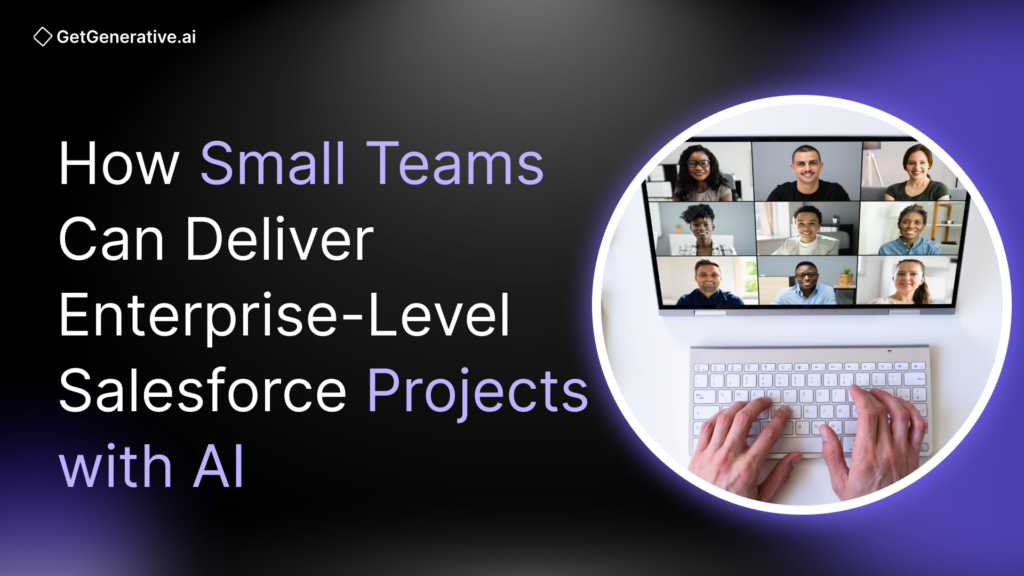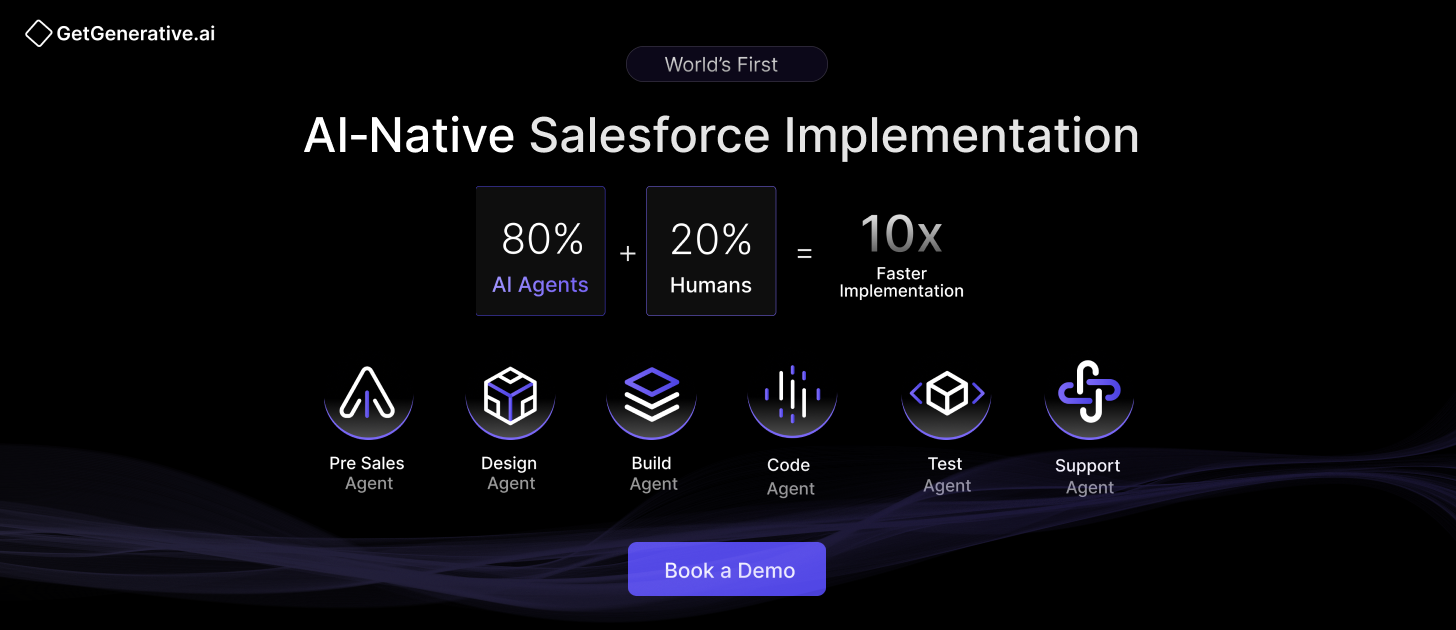How Small Teams Can Deliver Enterprise-Level Salesforce Projects with AI
Why Lean Teams Are Outpacing Giants with Smart Automation
In a world where digital transformation is often synonymous with massive consulting budgets and sprawling project timelines, small teams are flipping the narrative. Armed with AI-powered Salesforce tools, even the leanest teams can now execute large-scale, enterprise-grade CRM implementations faster, smarter, and with fewer resources.
Salesforce reports that its Einstein generative AI helps teams reduce costs and boost productivity by automating manual tasks, freeing up time to focus on strategic initiatives. For small teams, this is a game-changer. A single developer or admin can now generate Apex code, build automated workflows, and craft customer emails in seconds.
This blog examines how AI, low-code tools, and a focused strategy enable small Salesforce teams to achieve significant results—and supports this with industry data, best practices, and real-world case studies.
The Big Challenge for Small Salesforce Teams
Large Salesforce implementations typically involve multifaceted challenges: multi-cloud configurations (Sales, Service, Marketing), intricate user journeys, integrations with third-party systems, and compliance requirements across regions. Traditionally, these projects required expansive teams with architects, developers, QA, BAs, and project managers.
But small teams face a different reality:
- Limited headcount
- Tight budgets
- Pressure to deliver fast
A major bottleneck is time. For example, sales reps spend nearly 72% of their time on non-selling tasks (Salesforce State of Sales Report), leaving little bandwidth for higher-value activities. Small firms are often hesitant to adopt large-scale CRM systems; a 2025 NFIB report found that only 24% of small businesses had implemented AI tools, compared to 78% of large enterprises. The divide highlights both the challenge and the potential for transformation.
Yet small teams have something powerful on their side: agility. They make faster decisions, adapt quickly, and can implement new technology without battling through red tape. According to Salesforce research, 95% of SMB IT leaders feel confident in their AI skills, compared to 81% of enterprise peers. This makes small teams ideal candidates for leveraging AI in Salesforce.
Bottom Line: Small teams may lack scale, but they have speed, flexibility, and the tools to amplify impact.
Amplifying Impact: AI + Low-Code as Force Multipliers
The key to success lies in eliminating repetitive tasks and accelerating delivery through AI-assisted development and declarative automation. Two transformative pillars stand out:
1. Generative AI for Faster Development
A 2023 McKinsey study showed that AI tools helped developers complete coding tasks in half the time. More importantly, quality remained consistent—or even improved. AI excels at repetitive or well-understood patterns: boilerplate code, test classes, simple integrations.
Salesforce’s Einstein for Developers lets devs use natural language to generate Apex code or LWC components. For example, asking “Build a Lightning page showing Account and Opportunities” returns ready-to-use code scaffolding.
This dramatically improves prototyping and onboarding. Developers can:
- Auto-generate classes and trigger frameworks
- Refactor legacy code
- Write tests and deployment scripts faster
- Use AI to resolve common deployment errors
2. AI-Driven Low-Code Automation
Salesforce’s declarative tools have long empowered non-developers, but Einstein brings superpowers to Flow, App Builder, and bots.
Take Einstein for Flow—admins can simply describe what they want in plain English:
“Create a flow that assigns a follow-up task when a new Opportunity is created…”
Einstein then builds the process automation, complete with screens, record updates, and logic. Minimal tweaking is needed.
Additional AI-powered tools for admins include:
- Einstein Bots – Easily configured to answer FAQs
- Einstein Activity Capture – Auto-logs emails, syncs meetings, and summarizes threads
- Salesforce App Builder – AI suggests page layouts and field placements
These features enable small teams to build and iterate quickly, with enterprise-grade stability but without writing complex code.
Automating Business Operations with Einstein GPT
Salesforce’s embedded AI tools now extend well beyond development:
Einstein GPT for Sales and Service
- Sales GPT drafts personalized outreach emails, meeting summaries, and call logs.
- Service GPT generates support responses, articles, and knowledge base updates.
This reduces response time and ensures consistency across interactions.
Result: A small team can maintain high-quality customer engagement without additional staff.
Einstein Activity Capture
By syncing calendars and inboxes, this tool auto-logs activity and generates insights.
BACA Systems uses it to track every email and call. Sales reps no longer dig through inboxes—Einstein captures and summarizes every touchpoint.
Einstein Bots + Agentforce
These tools handle FAQs, lead qualification, and ticket triage.
No more waiting for support agents to log basic tickets—bots work 24/7.
Also Read – How to Master Vibe Coding: Tools, Mindset, and Best Practices
Strategic Best Practices for Small Teams Delivering Big
Having the right tools is only half the equation. For small teams to consistently succeed with enterprise-scale Salesforce projects, strategy, process discipline, and skill-building are equally critical. Here are proven best practices:
1. Align Work to a Clear Roadmap
Without a clear plan, it’s easy to get distracted by shiny features or one-off requests. A focused roadmap helps prioritize efforts that align with business goals.
Salesforce Foundations and Pilot features can be invaluable here—teams can test innovations without long-term commitment.
2. Leverage AppExchange and Prebuilt Tools
Why build from scratch when 80% of the functionality may already exist?
- Salesforce AppExchange features over 7,000 prebuilt apps and components
- Small teams can combine these with native capabilities to deliver complex functionality quickly
- Use Salesforce Optimizer to identify underused features and quick wins
As one expert put it: “AppExchange lets small teams deliver like large teams—with less effort and more confidence.”
3. Build a Learning Culture
Lean teams win by investing in continuous learning. Salesforce’s Trailhead platform and community resources make it easy.
- Encourage admins and business users to upskill on Einstein GPT, Flow Builder, App Builder, and DevOps
- Empower end users to handle basic automations and dashboards—this reduces backlog and boosts adoption
4. Prioritize Data Hygiene and AI Governance
AI is only as good as the data it learns from. Poor data = poor predictions and automation breakdowns.
Best practices:
- Set up regular data validation routines
- Implement naming conventions and field usage rules
- Train teams on Salesforce’s AI Trust Layer, which anonymizes data, restricts sharing, and ensures ethical AI use
- Assign review and approval workflows for AI-generated output (especially emails, code, and case responses)
5. Apply Agile and DevOps Practices
You don’t need a huge team to adopt Agile. Even two developers can iterate in short sprints, use version control, and test continuously.
Tools that help:
- Salesforce DX for source tracking
- Copado, Gearset, or Flosum for CI/CD
- Scratch Orgs for isolated testing
- Einstein for Developers for automatic test class generation
This setup gives small teams the same operational muscle as a large enterprise delivery squad.
6. Know When to Partner
Despite best efforts, some tasks may exceed your internal bandwidth. For specialized integrations (e.g., SAP, Oracle, external ERPs), consider:
- Hiring Salesforce-certified contractors for time-bound help
- Engaging Salesforce Consulting Partners
- Co-delivering with agencies using your existing Salesforce org and governance model
Often, limited and strategic outsourcing saves time and avoids burnout while preserving team autonomy.
Also Read – Traditional vs. Vibe Coding Lifecycle: A Step-by-Step Comparison
Case Studies
Let’s revisit four standout examples that showcase how AI-enabled small Salesforce teams deliver like large enterprises:
RealZips
A niche data services company that used Einstein AI to transform its GTM execution:
- 30% increase in website traffic
- 40% growth in new-account outreach
- 10x faster email creation
- Built campaigns and journeys without needing a marketing automation team
Takeaway: With AI handling the bulk of execution, a small marketing team operated with enterprise velocity.
BACA Systems
A manufacturer running Salesforce Sales Cloud with only one dedicated admin. Using Einstein Activity Capture, Flow, and GPT tools:
- Doubled sales productivity
- Reduced admin workload by several hours per week
- Increased sales reps face time with clients
Crexi
This real estate platform optimized its sales process using Einstein GPT and automation:
- Saved 5 hours per day per rep
- Reps now spend 80% of their time in high-value sales activities
- AI handles lead routing, follow-ups, and content drafting
Result: Sales engagement and closing rates rose significantly with the same headcount.
Ennube Solutions
A small Salesforce consultancy needing multi-language outreach. By adopting Einstein 1 Sales:
- 5,600% increase in emails sent
- 50% faster sales cycle
- Personalized emails are auto-generated, overcoming content and language barriers
Conclusion
The message is clear: you don’t need a big team to build big things.
Thanks to Salesforce’s AI-first ecosystem—including Einstein GPT, Flow, Developer Copilot, and low-code platforms—small teams can scale their efforts, automate intelligently, and deliver solutions once reserved for large enterprise players.
Implement Salesforce at Lightning Speed
At GetGenerative.ai, we don’t just add AI to legacy systems—we’ve rebuilt the Salesforce implementation process from the ground up with AI at its core.
The result? A smarter, faster, AI-native approach that helps you go live in days, not months.
👉 Explore our Salesforce AI consulting services




